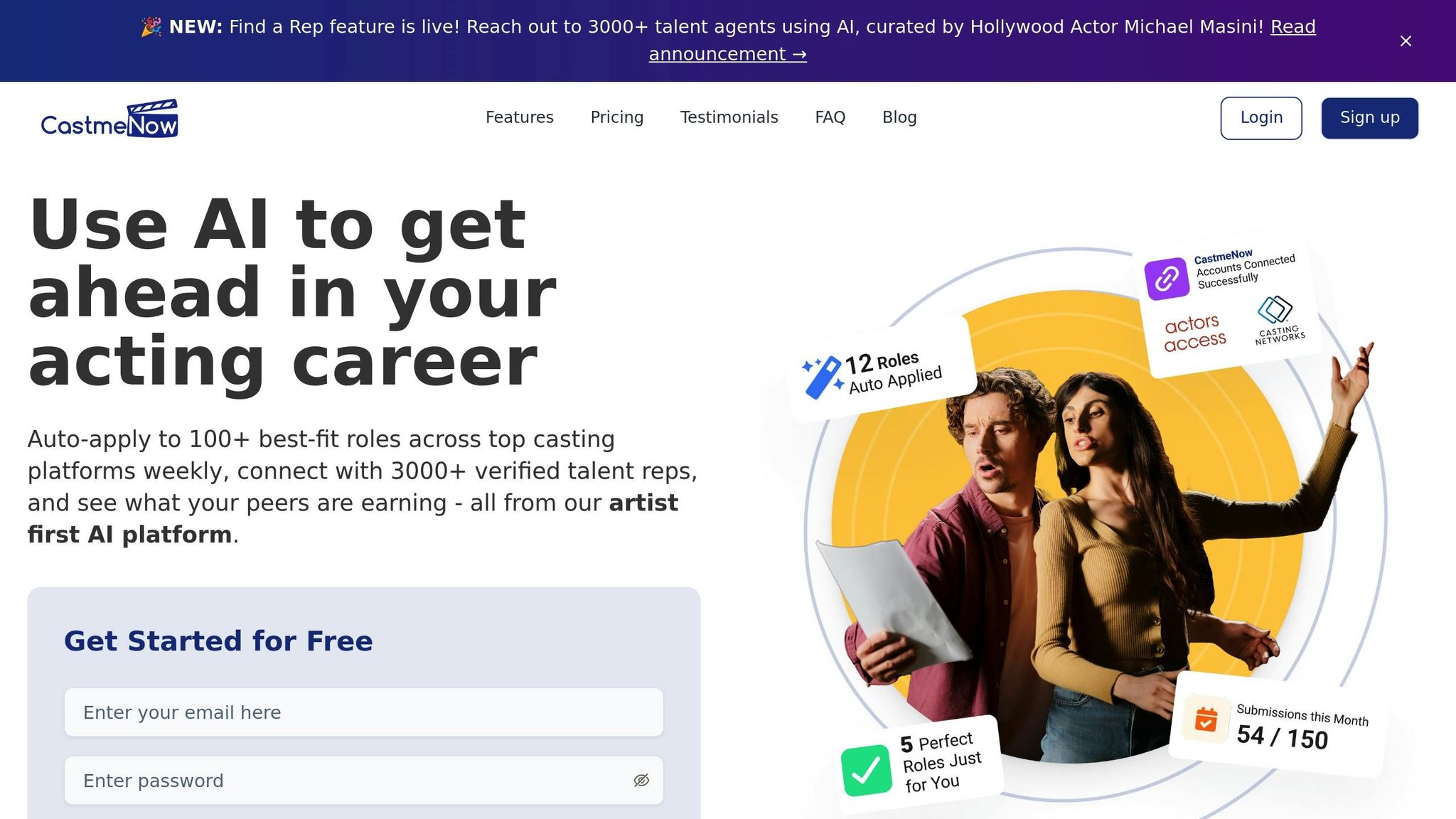How AI Improves Casting Application Scheduling
Explore how AI revolutionizes casting application scheduling, streamlining processes and enhancing role matching for actors.

AI is transforming casting applications by automating tedious tasks and optimizing role matching. Tools like CastmeNow streamline the process by scanning platforms 24/7, applying for roles, and coordinating schedules based on actor preferences. Key technologies include machine learning for precise role matching, natural language processing (NLP) to analyze casting calls, and automated scheduling systems to manage auditions. These innovations save time, reduce errors, and help actors focus on their craft.
Key Benefits of AI in Casting:
- Time Savings: Applications are submitted instantly, even outside working hours.
- Better Role Matches: AI learns from past successes to improve compatibility over time.
- Reduced Errors: Automation minimizes missed deadlines and mismatched applications.
- Convenience: Tools like CastmeNow integrate with platforms like Casting Networks and Actors Access.
Considerations:
- Data Privacy: Ensure platforms use secure authentication.
- Profile Accuracy: Keep details updated for optimal matches.
- Cost: Subscriptions start at $3/month, offering significant time savings.
AI can't replace talent but acts as a powerful assistant, giving actors more opportunities to succeed. By automating the administrative side, AI lets performers focus on auditions and building connections.
Key AI Technologies Changing Casting Scheduling
Three advanced AI technologies are reshaping how casting applications are scheduled. Each one brings its own strengths to address the challenges actors face when juggling audition opportunities.
Machine Learning for Role Matching
Machine learning has a knack for uncovering patterns in data that might slip past human observation. In casting applications, this technology processes massive amounts of information - actor profiles, casting call details, and past application outcomes - to pinpoint the best matches. By evaluating an actor’s skills and attributes against specific casting call requirements, these systems continuously refine their accuracy. Over time, they learn from successful matches and rejections, becoming increasingly effective at identifying roles an actor is likely to land.
Platforms like CastmeNow (https://castmenow.co) use machine learning to make this process seamless. Behind the scenes, these algorithms connect actors with opportunities that align with their profiles and career aspirations. The speed and precision of this technology save actors hours of manual searching, giving them more time to focus on their craft.
Natural Language Processing (NLP) in Reading Casting Calls
Natural language processing (NLP) enables AI to "read" and interpret casting calls, pulling out critical information like character descriptions, shooting dates, locations, and pay details. For example, if a casting call specifies, "must be available for night shoots in downtown Los Angeles from March 15–20", NLP can instantly identify the location, dates, and availability requirements.
NLP also tackles one of the trickiest issues in global casting: time zone differences. Miscommunication about time zones is responsible for 76% of scheduling errors in international settings. By managing these complexities automatically, NLP reduces the risk of missed opportunities. It can even assess the urgency or tone of a casting call, helping actors prioritize auditions with tight deadlines or high competition. This rapid analysis integrates seamlessly with scheduling tools, making the entire process faster and more efficient.
Automated Scheduling Systems
Automated scheduling systems bring everything together by managing the logistics of application timing and audition coordination. These systems work around the clock, optimizing when and how applications are sent to ensure maximum visibility. They factor in submission deadlines, casting director preferences, and historical data to determine the best timing. In fact, these decisions can be made in as little as 2 seconds.
Step-by-Step Guide: Using AI Tools for Casting Applications
AI-powered tools are revolutionizing how actors approach auditions. Here’s a simple, three-step guide to help you get started.
Setting Up Casting Profiles and Preferences
Start by completing your casting profiles with as much detail as possible. Include information about your acting style, emotional range, physical traits, and any specialized training. For example, if you excel in dramatic roles, highlight the specific techniques you’ve mastered.
Your preferences play a big role in how AI tools prioritize opportunities for you. Tailor these settings based on where you are in your career:
- Beginners: Keep your options broad and focus on non-union opportunities like student films, indie productions, and background work.
- Intermediate actors: Aim for a mix of roles to build a diverse portfolio, such as co-star roles, commercials, and regional theater.
- Advanced performers: Narrow your focus to leading roles, specific character types, or union productions.
Here’s a quick breakdown of how preference settings can impact your opportunities:
| Preference Type | Volume | Quality | Ideal For |
|---|---|---|---|
| Very Specific | Lower | Higher | Experienced actors with defined niches |
| Balanced | Moderate | Good | Actors seeking steady opportunities |
| Broad | Higher | Variable | Beginners building experience |
Once your profile is set up, connect your accounts to expand your reach and streamline the process.
Connecting with Casting Networks

After completing your profile, the next step is linking it to your existing casting platforms. Tools like CastmeNow make this easy by integrating with popular platforms such as Casting Networks and Actors Access. The process involves secure authentication, ensuring your credentials remain protected.
By connecting your accounts, the AI gains access to casting calls and can submit applications on your behalf. This integration allows the system to monitor multiple platforms around the clock, giving you access to opportunities you might otherwise miss. Whether you’re busy with other work, preparing for auditions, or simply taking a break, the AI works in the background to keep you in the loop.
Automating Role Applications with CastmeNow

Once your profiles are connected and preferences fine-tuned, CastmeNow takes over to simplify the application process. The platform’s auto-apply feature ensures you never miss a chance to audition for roles that match your criteria.
Here’s how it works: CastmeNow reviews your profile, compares it to casting requirements, and factors in your availability and role preferences. If there’s a match, the system submits your application instantly. This ensures your submissions reach casting directors quickly and stay aligned with your career goals.
CastmeNow offers two subscription tiers:
- Basic Plan: $3/month for up to 10 auto-applications daily.
- Unlimited Plan: $8/month for unlimited applications and advanced analytics.
A free 30-day trial is also available, so you can test the platform before committing.
Even with automation, you’re always in control. You can update your preferences at any time to reflect new skills, changing priorities, or updated availability. The AI adapts immediately, ensuring every application aligns with your latest goals.
Benefits and Considerations of AI-Powered Casting Scheduling
AI-powered scheduling brings clear advantages over traditional manual methods, but it also comes with some important factors to consider. Let’s dive into how AI compares to manual scheduling and what actors should keep in mind when using this technology.
Comparison of AI vs. Manual Scheduling
The gap between AI-driven and manual casting scheduling is significant. For instance, companies using AI-powered scheduling tools have reported a 50% reduction in time-to-fill positions and far less time spent on scheduling tasks. These efficiencies translate seamlessly to the casting world, where timing and precision are crucial for actors.
| Feature | AI-Driven Scheduling | Manual Scheduling |
|---|---|---|
| Speed | Instant, 24/7 submissions | Time-consuming, limited availability |
| Accuracy | Data-driven, highly precise | Prone to human error and subjectivity |
| Access to Opportunities | Broad, uncovers hidden roles | Limited by manual searches |
| Error Rates | Low, automated checks | Higher, manual data entry risks |
| Flexibility | Adapts to last-minute changes | Rescheduling is challenging |
| Notifications/Reminders | Automated, real-time updates | Manual, often overlooked |
AI systems work tirelessly, processing applications instantly and accurately at any hour. Tools like CastmeNow allow actors to apply for roles even at 2 AM, giving them a competitive edge in busy markets. On the other hand, manual scheduling requires constant vigilance during business hours, making it easier to miss out on opportunities.
Another key advantage is error reduction. Manual scheduling often results in missed deadlines, forgotten applications, or mismatched roles. AI eliminates these issues by ensuring every submission aligns with your profile and preferences.
AI also expands your reach. While manual searches are limited to what you can find during your available hours, AI continuously scans casting platforms for roles that fit your profile. This is especially beneficial for actors in smaller markets or those seeking niche roles.
However, while AI offers impressive efficiencies, there are practical elements actors need to consider.
Key Considerations for Actors
Despite the clear benefits of AI-driven scheduling, actors must address a few key factors to maximize its potential.
Data privacy is a top priority. Connecting platforms like Casting Networks and Actors Access through automation tools involves sharing personal and professional information. Always choose platforms with strong security measures. For example, CastmeNow uses secure authentication to protect your credentials.
Profile accuracy is another critical factor. Unlike manual applications, where you can tailor your approach for each role, AI relies entirely on the details in your profile. Regular updates are essential to ensure accurate matches. This includes keeping your skills, availability, physical attributes, and career goals current.
Control over application criteria is also important. While automation saves time, you need to regularly review and fine-tune your application settings. If your preferences are too broad, you may end up applying for irrelevant roles. If they’re too narrow, you could miss out on great opportunities.
Balancing automation with personal involvement is key. While AI handles repetitive tasks, actors still need to monitor their applications, update profiles, and stay engaged with the industry. Automation should complement your efforts, not replace the personal connections and relationships that are vital to an acting career.
Cost considerations are worth noting too. While manual applications don’t require subscription fees, they demand a significant time investment. The time savings offered by AI often justify the cost. For example, CastmeNow offers plans starting at $3 per month for basic features and $8 per month for unlimited access - reasonable for actors juggling auditions and other commitments.
It’s also important to understand the limitations of AI. While these tools excel at matching criteria and automating submissions, they can’t replace the human side of acting - your talent, personality, and ability to connect with casting directors. The goal of AI is to give you more chances to showcase those irreplaceable qualities.
Finally, automated reminders and notifications reduce no-shows and missed deadlines by keeping everyone informed in real time. However, actors still need to manage their schedules and prepare thoroughly for auditions booked through AI.
The key takeaway? Treat AI as a helpful assistant, not a substitute for your professional judgment. Let it handle the busywork so you can focus on honing your craft and building meaningful connections in the industry. With the right balance, AI can be a game-changer for your acting career.
Future Trends and Best Practices in AI Casting Scheduling
The casting world is undergoing a major transformation, driven by advancements in AI technology. For actors, staying ahead of these changes and adapting to new tools and strategies could make all the difference in staying competitive.
Emerging Trends in AI Casting
AI is reshaping casting in ways that were once hard to imagine. Take predictive analytics, for example. By analyzing historical data with machine learning, it’s helping casting professionals forecast outcomes like role suitability and project success. In fact, studies have shown that predictive analytics can boost quality by up to 20% while cutting costs significantly.
Soon, AI platforms may be able to evaluate an actor’s compatibility with a role by analyzing their skills, experience, and even the specific demands of the character. Emotion AI is also gaining traction, with tools that analyze facial expressions, vocal tones, and body language during self-tape submissions. This technology could become a standard part of the casting process in the near future.
Another exciting development is how AI is contributing to diversity and inclusion. By analyzing demographic trends, AI can help casting directors make more inclusive decisions. Isabel Yishu Yang, the founder of ArbiLex, summed it up well: "Diversity is an objective we can model". AI is also personalizing the application process by predicting behavioral patterns and tailoring interactions accordingly.
Looking ahead, it’s estimated that by 2025, around 83% of companies will use AI for screening and matching talent. Casting platforms are already reflecting this trend. For instance, Unilever used AI and predictive analytics to cut recruitment time by 75% and improve employee retention by 16%. While this example comes from corporate hiring, similar efficiencies are beginning to shape the casting industry.
With these shifts underway, actors need to adjust their strategies to make the most of AI-driven opportunities.
Best Practices for Actors Using AI Tools
As AI continues to influence casting, actors can’t afford to ignore these tools. But success lies in finding the right balance between automation and personal effort. Here’s how you can use AI casting tools effectively:
-
Keep your profile current.
AI systems rely on accurate data, so update your profile regularly with your latest skills, physical traits, availability, and career goals. Platforms like CastmeNow use this information to match you with the right roles. -
Fine-tune your preferences.
Review your application analytics to see how well your submissions align with your goals. Adjust your criteria to focus on opportunities that truly fit your aspirations. -
Prioritize data security.
Choose casting tools that comply with privacy laws like GDPR and EEOC. Look for features like strong authentication to protect your personal data. -
Ensure platform integration.
Opt for tools that work seamlessly with popular casting platforms like Casting Networks and Actors Access. This will expand your reach without overcomplicating your workflow. -
Monitor your likeness rights.
Use tools like Google Alerts to track unauthorized use of your image or voice. Always review contracts carefully, especially clauses related to AI and your likeness or voice rights. -
Focus on irreplaceable skills.
While AI can handle many tasks, it can’t replicate live performance, improvisation, or deep emotional connection. Strengthen these skills to stand out. -
Stay informed.
Keep up with the latest AI developments in the entertainment industry. Being proactive will help you adapt as changes occur.
Actor Tye Sheridan offers a thoughtful perspective on navigating this evolving landscape: "We have to acknowledge that it's here and it's gonna stay around, you know. We have to figure out how to adopt it into our process in a responsible way so it still protects us and protects the nature of what we do as performers and as artists".
Looking ahead, AI might even enable actors to audition via AI-generated avatars. As this technology becomes more integrated into casting, adopting these best practices will help you stay ahead and thrive in a rapidly changing industry.
Conclusion: How AI Improves Casting Application Scheduling
AI has revolutionized the way actors navigate casting applications, transforming a once tedious, manual process into a faster, more efficient system. The results speak for themselves: automated scheduling tools can cut the time it takes to fill roles by up to 50%, while automated reminders help reduce no-show rates by as much as 30%.
By automating tasks like role searches and submissions, AI allows actors to focus on what matters most - delivering great performances. Its ability to match roles based on preferences and availability ensures fewer mismatches and increases the chances of callbacks. Platforms like CastmeNow take this a step further by acting as an automation tool that enhances existing platforms, such as Casting Networks and Actors Access. This means actors can access more casting opportunities without the repetitive manual effort, as applications are submitted automatically around the clock.
Another standout feature is the platform's analytics tools, which provide insights that actors can use to refine their application strategies. By analyzing patterns like submission timing and success rates, actors can make smarter, data-informed decisions about their career moves.
Looking ahead, experts anticipate AI will continue to make casting more efficient. With advancements in machine learning and natural language processing, future tools could refine role matching even further, making the process smoother and more inclusive for actors.
FAQs
How does AI protect your personal information when automating casting applications?
AI keeps your personal information safe using advanced tools like data encryption and anonymization. These methods are designed to block unauthorized access, ensuring your sensitive details stay private and secure at every step.
On top of that, AI systems adhere to strict security standards and comply with key data privacy laws, including GDPR and CCPA. By sticking to these guidelines, AI ensures your casting applications are managed with care and responsibility.
How can actors keep their profiles accurate for better AI role matching?
Keeping your profile updated is key to landing the right roles. Make sure to regularly refresh your headshots, list your latest skills and experience, and double-check that physical details like height and appearance are accurate. A polished and current profile helps AI tools connect you with roles that truly fit, boosting your chances of finding the perfect opportunity.
How can actors use AI tools effectively while staying personally involved in their casting journey?
Actors can tap into the power of AI tools to take care of time-consuming tasks like managing schedules and submitting applications. By offloading these repetitive chores, they free up more time and energy to concentrate on what truly matters - preparing for auditions and refining their skills.
However, the human element remains irreplaceable. Building genuine connections, networking effectively, and letting their personality shine during auditions are key to standing out in a crowded industry. By blending AI's practical efficiency with their own personal efforts, actors can open doors to more casting opportunities while staying true to who they are.

